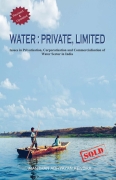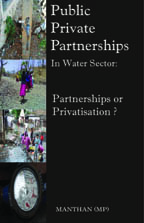/sub-categories/books-and-book-reviews
Books and Book Reviews
Economics of River Flows - A book by Dr.Bharat Jhunjhunwala
Posted on 09 Aug, 2010 06:06 PMThis book is essential reading for economists, power sector officials, power generation companies and environmentalists alike.
Dr.Bharat Jhunjhumwala holds a BSc degree in physics, chemistry and mathematics. He earned his PhD in food and Resource Economics from University of Florida at a tender age of 23 years. He joined Indian institute of management, Bangalore as Assistant professor immediately thereafter. He lived in a slum for two years to understand poverty and organized the Trade Union at IIM during the Emergency. He resigned from the IIM and became a consultant to donor agencies like Swiss Development Cooperation, Oxfam, Care, Overseas Development Institute and others mainly on rural development and watershed issues. He writes a column on economic issues for about 50 newspapers in india. He lives on the banks of River Alaknanda in uttarakhand on the feet of Lord Badri Vishal.
Step by step: Achieving sustainable sanitation - Lessons from civil society experiences - A report by Arghyam
Posted on 29 Jul, 2010 02:19 AMSeveral concerns were raised during the discussions on the the manner in which the Total Sanitation Campaign (TSC) was being implemented, followed by identification of steps that were needed to ensure social, technical, institutional, financial and environmental sustainability of the programme.
The discussions revealed that:
- The TSC indeed led to the mainstreaming of sanitation in India. However, more emphasis was placed on hardware targets, while social mobilisation had been largely ignored. Thus, inspite of increase in the coverage of toilets, their usage and sustainability had remained low.

Seeds of hope - Case studies from the Planning Commission and Lokayan
Posted on 12 Jul, 2010 03:33 AMThis set of case studies is part of a book prepared by Lokayan in collaboration with the Planning Commission titled “Seeds of Hope", covers themes of agricultur
Neel Ka Dhabba - Sansthayen Narayan Parayan Bane: Essays in Hindi by Mahatma Gandhi and Vinobha Bhave
Posted on 17 Jun, 2010 01:05 AMNeel Ka Dhabba recounts how Gandhiji washed away the stain of cruel oppression of Champaran's Indigo farmers forcibly made to grow Indigo by processors-traders, using caution, non-violence, courage and humility. The essay is narrated by Gandhiji himself.
In Sansthayen Narayan Parayan Bane, Acharya Vinoba takes a critical look at the work of voluntary development organisations, and details what and how their goals, functioning and funds management should be.

Water: Private, Limited - Issues in privatisation, corporatisation and commercialisation of water sector in India by Manthan Adhyayan Kendra
Posted on 31 May, 2010 02:44 PM This book by Manthan Adhyayan Kendra, highlights the emerging issues related to privatisation of water in the context of the recent surge of privatisation-related initiatives in the water sector in India.
This book by Manthan Adhyayan Kendra, highlights the emerging issues related to privatisation of water in the context of the recent surge of privatisation-related initiatives in the water sector in India.
The history of attempts at privatisation of water till recent times from all across the globe indicate that they have been met with strong resistance where ever they have been implemented. This is because of the total failure of all these programmes to address the social responsibility of providing water to all without consideration of profits.
However, this backlash against privatisation has led international donor agencies to use a different type of strategy and language. This has led to a shift from Private Sector Partnership (PSP) to Public Private Partnership (PPP) and more recently to the Water Sector Reforms (WSR) in countries such as India.
Negotiate: Reaching agreements over water - Paper by IUCN
Posted on 25 May, 2010 06:49 PM This book by IUCN is directed at practitioners involved in water-related negotiations that aim at fair and mutual agreements on optimum and sensible use of water by all. The book provides the necessary motivation, ideas, tools and inspiration for people involved in water negotiations throughout the world.
This book by IUCN is directed at practitioners involved in water-related negotiations that aim at fair and mutual agreements on optimum and sensible use of water by all. The book provides the necessary motivation, ideas, tools and inspiration for people involved in water negotiations throughout the world.
Many a times, the underlying approach to negotiations involves bargaining and competition. However, the book believes that emphasis on constructive engagement involving multiple perspectives and consensus building can lead to fair and equal distribution of this valuable resource to everyone.
The book is divided into five chapters that give out important key messages as to how to go about the process of negotiating:
Silviculture of Indian Trees:A book by Robert Scott Troup
Posted on 06 Mar, 2010 11:10 AMThe Silviculture of Indian Trees, is a seminal reference work in three volumes, that contains in-depth information (from a silvicultural point of view) about nearly all tree species of India, covering some 63 botanical orders. It is the outcome of twenty years of field-based research by Robert Scott Troup, a British forestry expert who spent much of his career in India, and is considered a classic landmark work on the subject.
The book starts with an introduction, followed by information organised by the botanical order, genera and finally, species. Each sub-section on a specific species, contains details such as the botanical name, vernacular names, distribution and habitat, silvicultural characters (climatic, temperature, soil conditions that help the tree grow), botanical descriptions as well as silhoutte drawings of the seed seedling leaf trunk root flower fruit bark and other plant parts, uses, flowering fruiting and leaf-shedding process as well as season, natural and artificial reproduction methods and rate of growth, germination process and role of animals birds insects wind and water, and botanically allied species.

Geology of India - DN Wadia - Macmillan publishers (1919)
Posted on 01 Mar, 2010 12:10 AMThe Geology of India by DN Wadia, a geologist with the Geological Survey of India, is considered to be one of the most important and complete reference works available today on the subject.
The book divides India into three main geological divisions - the triangular plateau of the peninsula, the mountainous or the extra-peninsular region bordering India on the west north and east, and the Indo-gangetic plain extending from the valley of the Indus to the valley of the Brahmaputra in Assam. The desert region of western Rajasthan is considered to be a unique fourth category, as it combines characteristics of two of the three main divisions.

Book : "Public-Private Partnerships in Water Sector: Partnerships or Privatisation?"
Posted on 01 Feb, 2010 05:17 PMAbout the Book –

Public-Private Partnerships (PPPs) are supposed to provide solutions to many of the existing problems related to infrastructure projects – in both execution and operation. Currently, there are PPP projects in almost all the sectors including roads, ports, airports, water, sewerage, solid waste management and transport among others. It is, therefore, important to do a reality check on PPP projects and their efficacy in addressing the problems faced by the public sector water supply services and other infrastructure sectors as well.
The report looks at various aspects of PPPs, beginning from why PPPs have come to be regarded as the major approach for infrastructure development in the country, the circumstances that lead to the change in approach from direct privatisation to public-private partnerships, the current status of the PPP projects that are being executed in India, especially in the water sector, to the current estimates and projections of investment requirements for infrastructure development in India by governments and International Financial Institutions (IFIs).